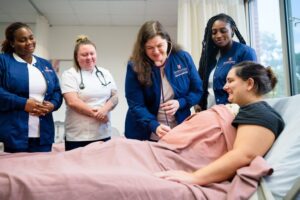Access to Care
Our goal within this focus area is that every community in North Carolina’s primary and behavioral health needs are served by a talented, engaged, diverse, and robust workforce
Perspective
Nearly three million people in North Carolina live in places deemed health professional shortage areas. And in 2021, the state ranked 25th in access to primary care and 26th in access to mental health providers - with significant, and increasing, gaps between rural and non-rural areas. Further, estimates now show the state will be short as many as 21,000 nurses within a decade.
For North Carolina to be a place where everyone has the opportunity to be as healthy as possible, we must develop and invest in solutions bolstering the health care workforce, focusing on training, recruitment, composition, and deployment. It is also essential that we prioritize efforts in communities where a lack of workforce has had the most significant impact in terms of health outcomes and economic opportunity.
Approach
Our approach centers on identifying and spreading models that address workforce shortages and distribution as well as supporting policy analysis that contributes to the ongoing evolution of the health care system. Specifically, our current focus is directed toward:
- Addressing shortages, maldistribution, and diversity in the workforce comprised of those who diagnosis and treat (physicians, physician assistants, and advanced practice nurses).
- Addressing shortages, maldistribution, and diversity in the nursing workforce.
- Increasing and improving training, employment opportunities, and career ladders for community health workers, peer support, and others expanding access.
Examples of our Work in this Area
- The NC Medical Society’s Community Practitioner Program, funded by a recent $2.25 million foundation grant, supports recruitment of providers by increasing preceptorships and loan repayment in primary care, behavioral health services, and maternal and women’s health in rural and other health care shortage areas.
- A $720,000 grant is supporting the NC Center on the Workforce for Health, a forum for collaboration among health employers, workers, educators, regulators, policymakers, and others to identify and address challenges and opportunities to improve the health workforce.
- Grant recipients, the Health Equity through Action and Leadership (HEAL) Collaborative and NC Community Health Worker Association are launching learning collaboratives and promoting leadership and training opportunities for community health workers to support the development and integration of the role in health and health-related systems statewide.
- Over the next several months, we will work with partners to identify and highlight models focused on increasing and retaining the nursing workforce, in addition to other health care workforce domains.
As part of our commitment to highlight and strengthen approaches that support the state’s health care workforce - the Foundation has invested in the development of a series of case studies which were profiled and published by EdNC examining innovative approaches to partnership between health care employers and nursing training programs.
Can apprenticeships mitigate nursing shortages?
A partnership between Davidson-Davie and Atrium Health Wake Forest Baptist is the first registered nursing apprenticeship program in North Carolina. Learn more.
A partnership between a health system and community college to grow their local health care workforce
Craven Community College and CarolinaEast Health System partners to address their community’s health care workforce challenges. Learn more.
Images courtesy of EdNC

